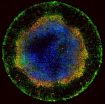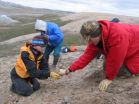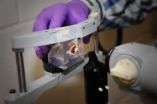(Press-News.org) CHICAGO --- The heart is more forgiving than you may think -- especially to adults who try to take charge of their health, a new Northwestern Medicine® study has found.
When adults in their 30s and 40s decide to drop unhealthy habits that are harmful to their heart and embrace healthy lifestyle changes, they can control and potentially even reverse the natural progression of coronary artery disease, scientists found.
The study was published June 30 in the journal Circulation.
"It's not too late," said Bonnie Spring lead investigator of the study and a professor of preventive medicine at Northwestern University Feinberg School of Medicine. "You're not doomed if you've hit young adulthood and acquired some bad habits. You can still make a change and it will have a benefit for your heart."
On the flip side, scientists also found that if people drop healthy habits or pick up more bad habits as they age, there is measurable, detrimental impact on their coronary arteries.
"If you don't keep up a healthy lifestyle, you'll see the evidence in terms of your risk of heart disease," Spring said.
For this paper, scientists examined healthy lifestyle behaviors and coronary artery calcification and thickening among the more than 5,000 participants in the Coronary Artery Risk Development in Young Adults (CARDIA) study who were assessed at baseline (when participants were ages 18 to 30) and 20 years later.
The healthy lifestyle factors assessed were: not being overweight/obese, being a nonsmoker and physically active and having low alcohol intake and a healthy diet. By young adulthood (at the beginning of the study), less than 10 percent of the CARDIA participants reported all five healthy lifestyle behaviors. At the 20-year mark, about 25 percent of the study participants had added at least one healthy lifestyle behavior.
Each increase in healthy lifestyle factors was associated with reduced odds of detectable coronary artery calcification and lower intima-media thickness -- two major markers of cardiovascular disease that can predict future cardiovascular events.
"This finding is important because it helps to debunk two myths held by some health care professionals," Spring said. "The first is that it's nearly impossible to change patients' behaviors. Yet, we found that 25 percent of adults made healthy lifestyle changes on their own. The second myth is that the damage has already been done -- adulthood is too late for healthy lifestyle changes to reduce the risk of developing coronary artery disease. Clearly, that's incorrect. Adulthood is not too late for healthy behavior changes to help the heart."
The bad news is that 40 percent of this sample lost healthy lifestyle factors and acquired more bad habits as they aged.
"That loss of healthy habits had a measurable negative impact on their coronary arteries," Spring said. "Each decrease in healthy lifestyle factors led to greater odds of detectable coronary artery calcification and higher intima-media thickness. Adulthood isn't a 'safe period' when one can abandon healthy habits without doing damage to the heart. A healthy lifestyle requires upkeep to be maintained."
Spring said the healthy changes people in the study made are attainable and sustainable. She offers some tips for those who want to embrace a healthy lifestyle at any age:
Keep a healthy body weight
Don't smoke
Engage in at least 30 minutes of moderate to vigorous activity five times a week
No more than one alcoholic drink a day for women, no more than two for men
Eat a healthy diet, high in fiber, low in sodium with lots of fruit and vegetables
INFORMATION:
Adults can undo heart disease risk
Picking up healthy habits in your 30s and 40s can slash heart disease risk
2014-06-30
ELSE PRESS RELEASES FROM THIS DATE:
New Tel Aviv University research links Alzheimer's to brain hyperactivity
2014-06-30
Patients with Alzheimer's disease run a high risk of seizures. While the amyloid-beta protein involved in the development and progression of Alzheimer's seems the most likely cause for this neuronal hyperactivity, how and why this elevated activity takes place hasn't yet been explained – until now.
A new study by Tel Aviv University researchers, published in Cell Reports, pinpoints the precise molecular mechanism that may trigger an enhancement of neuronal activity in Alzheimer's patients, which subsequently damages memory and learning functions. The research team, led ...
Study helps unlock mystery of high-temp superconductors
2014-06-30
A Binghamton University physicist and his colleagues say they have unlocked one key mystery surrounding high-temperature superconductivity. Their research, published this week in the Proceedings of the National Academy of Sciences, found a remarkable phenomenon in copper-oxide (cuprate) high-temperature superconductors.
Michael Lawler, assistant professor of physics at Binghamton, is part of an international team of physicists with an ongoing interest in the mysterious pseudogap phase, the phase situated between insulating and superconducting phases in the cuprate phase ...
Tropical countries' growing wealth may aid conservation
2014-06-30
DURHAM, N.C. -- While inadequate funding has hampered international efforts to conserve biodiversity in tropical forests, a new Duke University-led study finds that people in a growing number of tropical countries may be willing to shoulder more of the costs on their own.
"In wealthier developing countries, there has been a significant increase in public demand for conservation, which has not yet been matched by an equivalent increase in protective actions by the governments of those countries," said Jeffrey R. Vincent, a Duke environmental economist who led the study, ...
Using geometry, researchers coax human embryonic stem cells to organize themselves
2014-06-30
About seven days after conception, something remarkable occurs in the clump of cells that will eventually become a new human being. They start to specialize. They take on characteristics that begin to hint at their ultimate fate as part of the skin, brain, muscle or any of the roughly 200 cell types that exist in people, and they start to form distinct layers.
Although scientists have studied this process in animals, and have tried to coax human embryonic stem cells into taking shape by flooding them with chemical signals, until now the process has not been successfully ...
Research team pursues techniques to improve elusive stem cell therapy
2014-06-30
Stem cell scientists had what first appeared to be an easy win for regenerative medicine when they discovered mesenchymal stem cells several decades ago. These cells, found in the bone marrow, can give rise to bone, fat, and muscle tissue, and have been used in hundreds of clinical trials for tissue repair. Unfortunately, the results of these trials have been underwhelming. One problem is that these stem cells don't stick around in the body long enough to benefit the patient.
But Harvard Stem Cell Institute (HSCI) scientists at Boston Children's Hospital aren't ready ...
Oil palm plantations threaten water quality, Stanford scientists say
2014-06-30
If you've gone grocery shopping lately, you've probably bought palm oil.
Found in thousands of products, from peanut butter and packaged bread to shampoo and shaving cream, palm oil is a booming multibillion-dollar industry. While it isn't always clearly labeled in supermarket staples, the unintended consequences of producing this ubiquitous ingredient have been widely publicized.
The clearing of tropical forests to plant oil palm trees releases massive amounts of carbon dioxide, a greenhouse gas fueling climate change. Converting diverse forest ecosystems to these ...
New study: Ancient Arctic sharks tolerated brackish water 50 million years ago
2014-06-30
Sharks were a tolerant bunch some 50 million years ago, cruising an Arctic Ocean that contained about the same percentage of freshwater as Louisiana's Lake Ponchatrain does today, says a new study involving the University of Colorado Boulder and the University of Chicago.
The study indicates the Eocene Arctic sand tiger shark, a member of the lamniform group of sharks that includes today's great white, thresher and mako sharks, was thriving in the brackish water of the western Arctic Ocean back then. In contrast, modern sand tiger sharks living today in the Atlantic Ocean ...
First pediatric autism study conducted entirely online
2014-06-30
UC San Francisco researchers have completed the first Internet-based clinical trial for children with autism, establishing it as a viable and cost effective method of conducting high-quality and rapid clinical trials in this population.
In their study, published in the June 2014 issue of the Journal of the American Academy of Child and Adolescent Psychiatry, the researchers looked at whether an Internet-based trial was a feasible way to evaluate whether omega-3 fatty acids helped reduce hyperactivity in children with autism. The authors found that not only was it a valuable ...
Research proves shock wave from explosives causes significant eye damage
2014-06-30
Researchers at The University of Texas at San Antonio (UTSA) are discovering that the current protective eyewear used by our U.S. armed forces might not be adequate to protect soldiers exposed to explosive blasts.
According to a recent study, ocular injuries now account for 13 percent of all battlefield injuries and are the fourth most common military deployment-related injury.
With the support of the U.S. Department of Defense, UTSA biomedical engineering assistant professor Matthew Reilly and distinguished senior lecture in geological sciences Walter Gray have been ...
Earth-Kind roses analyzed for salt tolerance
2014-06-30
COLLEGE STATION, TX – Earth-Kind® roses are favorites with gardeners and landscapers. Chosen for their superior tolerance to heat, drought, and pests, as well as their outstanding performance in landscapes, Earth-Kind® roses can thrive in most environments, even with limited care. A new study focused on determining the best Earth-Kind® varieties for withstanding the challenges of salt stress.
As alternative water sources such as reclaimed water are becoming more commonly used as irrigation for urban landscapes and agricultural crops, plants are being subjected to higher ...
LAST 30 PRESS RELEASES:
Gut microbiome connected with heart disease precursor
Nitrous oxide, a product of fertilizer use, may harm some soil bacteria
FAU lands $4.5M US Air Force T-1A Jayhawk flight simulator
SimTac: A physics-based simulator for vision-based tactile sensing with biomorphic structures
Preparing students to deal with ‘reality shock’ in the workplace
Researchers develop beating, 3D-printed heart model for surgical practice
Black soldier fly larvae show promise for safe organic waste removal
People with COPD commonly misuse medications
How periodontitis-linked bacteria accelerate osteoporosis-like bone loss through the gut
Understanding how cells take up and use isolated ‘powerhouses’ to restore energy function
Ten-point plan to deliver climate education unveiled by experts
Team led by UC San Diego researchers selected for prestigious global cancer prize
Study: Reported crop yield gains from breeding may be overstated
Stem cells from human baby teeth show promise for treating cerebral palsy
Chimps’ love for crystals could help us understand our own ancestors’ fascination with these stones
Vaginal estrogen therapy not linked to cancer recurrence in survivors of endometrial cancer
How estrogen helps protect women from high blood pressure
Breaking the efficiency barrier: Researchers propose multi-stage solar system to harness the full spectrum
A new name, a new beginning: Building a green energy future together
From algorithms to atoms: How artificial intelligence is accelerating the discovery of next-generation energy materials
Loneliness linked to fear of embarrassment: teen research
New MOH–NUS Fellowship launched to strengthen everyday ethics in Singapore’s healthcare sector
Sungkyunkwan University researchers develop next-generation transparent electrode without rare metal indium
What's going on inside quantum computers?: New method simplifies process tomography
This ancient plant-eater had a twisted jaw and sideways-facing teeth
Jackdaw chicks listen to adults to learn about predators
Toxic algal bloom has taken a heavy toll on mental health
Beyond silicon: SKKU team presents Indium Selenide roadmap for ultra-low-power AI and quantum computing
Sugar comforts newborn babies during painful procedures
Pollen exposure linked to poorer exam results taken at the end of secondary school
[Press-News.org] Adults can undo heart disease riskPicking up healthy habits in your 30s and 40s can slash heart disease risk





